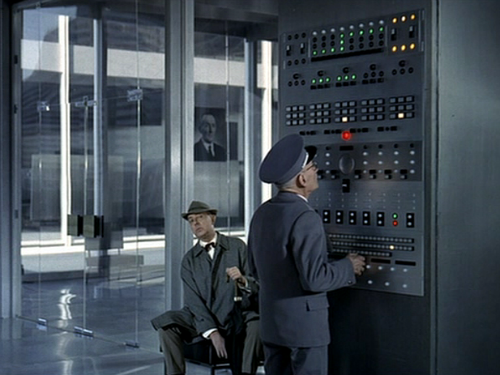
“It makes me sound old-fashioned, but I think I am an anarchist.”
Jacques Tati
“In a normal world, one would go out and walk into just any theater to see a film by Jacques Tati. Or Chaplin.”
Pedro Costa
“My favorite movie, this 1967 French comedy by actor-director Jacques Tati has the most intricately designed mise en scene in all of cinema. The restored 65-millimeter version, with four-track DTS sound, expands the possibilities of becoming lost in Tati’s vast frames and creatively finding one’s way again. His studio-constructed vision of Paris begins in daytime with nightmarishly regimented straight lines and right angles and proceeds to night with accidental yet celebratory curves of people instinctively coming together. It peaks in an extraordinary sequence, set in a gradually disintegrating restaurant, that comprises almost half the film: once various musicians start to perform, the viewer’s gaze inevitably follows the customers in a kind of improvised dance, collecting and juxtaposing simultaneous comic events and details. In this landscape everyone is a tourist, but Tati suggests that once we can find one another, we all belong. In English, French, and German; it’s sometimes shown without subtitles – but you won’t need them.”
Jonathan Rosenbaum1
“[Tati biographer David] Bellos assesses Playtime as ‘an expression of wonderment at humankind’s ability to create.’ It seems fitting: this miraculous movie, still years ahead of its time, so heroically unwilling to distinguish between the functional and the frivolous, is itself a wholly wondrous creation.”
Kent Jones2
“A year after my first encounter with Playtime, I moved from Manhattan to Paris, and in retrospect I think I can say that the film played a significant role in my decision. It was less a matter of my Francophilia than a dawning discovery about how to live in cities that this masterpiece had helped me to formulate. And, not surprisingly, I found I could apply this lesson more readily to Paris, with its outdoor café chairs that function as orchestra seating and the theatrical lighting of its streets at night. By contrast, I felt that in response to Manhattan’s sensory overload I was starting to feel detached from and deadened to the world around me whenever I left my one-room apartment. Playtime proposed a particularly euphoric form of reengagement with public space, suggesting ways of looking and finding connections, comic and otherwise, between supposedly disconnected street details – not to mention connections between those details and myself. (...) In Playtime, he liked to say, the only real star was his set – and maybe that was expensive, “but not any more than Sophia Loren.” (...) What other movie converts work into play so pleasurably by turning the very acts of seeing and hearing into a form of dancing?”
Jonathan Rosenbaum3
Lees hier de vertaling van “Jacques Tati, Historian” van Kristin Ross op Sabzian.
- 1Jonathan Rosenbaum, “The Color of Paradise,” Chicago Reader, 5 January 1998.
- 2Kent Jones, “Playtime”, Criterion Current, 3 June 2001.by Kent Jones.
- 3Jonathan Rosenbaum, “The Dance of Playtime,” Criterion Current, 18 August 2014.